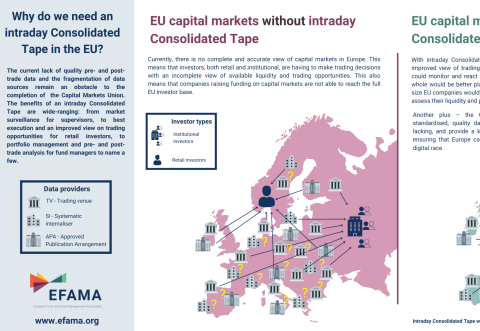Capital markets
Investment managers, acting on behalf of their retail and institutional clients, are among the largest investors in financial markets. They represent a key component of the market’s “buy-side” segment.
In representing the interests of its members on wholesale capital market issues, EFAMA advocates for fair, deep, liquid, and transparent capital markets, supported by properly regulated and supervised market infrastructure.
EFAMA responds to EC draft DA on integration of ESG into MiFID II
EFAMA's reply to ESMA's CP on PTRR services with regards to the clearing obligation
EFAMA response to the EBA consultation on the guidelines on the sound management of third-party risk for non-ICT related services
European Commission’s ambitious market integration package addresses many barriers to the Savings & Investment Union
EFAMA supports the majority of measures but warns against new ESMA supervisory reviews for large asset managers
Market data users have identified important gaps in plans for EU consolidated tape
List of recommendations show what is needed to ensure a successful tape.
Visual | Why do we need a real-time Consolidated Tape in the EU?
The current lack of quality pre- and post-trade data and the fragmentation of data sources remain an obstacle to the completion of the Capital Markets Union. The benefits of a real-time Consolidated Tape are wide-ranging: from market surveillance for supervisors, to best execution and an improved view on trading opportunities for retail investors, to portfolio management and pre- and post-trade analysis for fund managers to name a few.
3 Questions to Jean-Louis Schirmann on the use of EURIBOR
Q #1 How was Euribor impacted by the adoption of the Benchmark Regulation (BMR) and what are the relevant features of the reformed Euribor for investment managers?
3 Questions to Christophe Binet on LIBOR Transition
Q #1 When will LIBOR phase out and which rates will be replacing it?
The London Interbank Offered Rate, also known as LIBOR®, is a widely-used index for short-term interest rates that is commonly found in






































